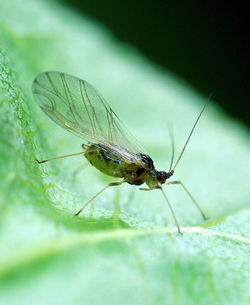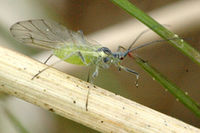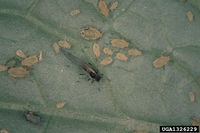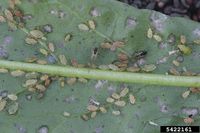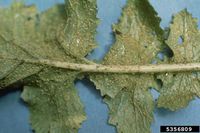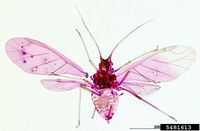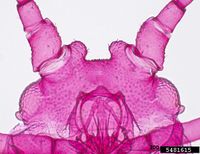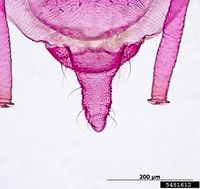Myzus persicae
| Literature database |
|---|
| 1402 articles sorted by: |
| • year (descending) |
| • research topics |
| • countries/regions |
| • host plants |
| • list of natural enemies |
Myzus persicae (Sulzer, 1776) - (green peach aphid)
The aphid is a serious pest of many crops as well as a very important vector of numerous plant viruses (e.g. Potato virus Y or beet yellowing viruses). Its host plants include artichoke, beans, Brassica crops, beets, clover, cotton, cucumber, maize, peas, peppers, potato, Prunus fruits, strawberry, sweet potato, tobacco, tomato, vetches, as well as various ornamentals. The aphid has a world-wide distribution. The damage is caused by high density populations (resulting in wilting and stunting) and by the transmission of plant viruses.
The aphid reproduces parthenogenetically during the summer with the females giving birth to live nymphs. These reproduction cycles may last about 2 weeks. When populations reach a high density, winged form are produced. These can disperse over long distances by wind and storms. The aphid might go through 10 or more generations per year. In the autumn, eggs are laid which overwinter.
| Vernacular names | |
|---|---|
| • Deutsch: | Grüne Pfirsichblattlaus Tabaklaus |
| • English: | green peach aphid peach-potato aphid spinach aphid |
| • Español: | pulgón verde del melocotonero afido verde del ajonjolí pulgón verde del duraznero |
| • Français: | puceron vert du pêcher |
| • Português: | pulgão-da-batata pulgão-verde-claro |
The adults are about 2 mm long. The winged form is dark brown to black and the apterae either green, yellow or reddish. The population generation time lasts around 2-3 weeks.
Synonyms:
Aphis dianthi
Aphis malvae
Myzodes persicae
Myzus tabaci
For details see the respective page in the BugwoodWiki.
- Other images of Myzus persicae (IPM Images and Wikimedia Commons - click to enlarge)
